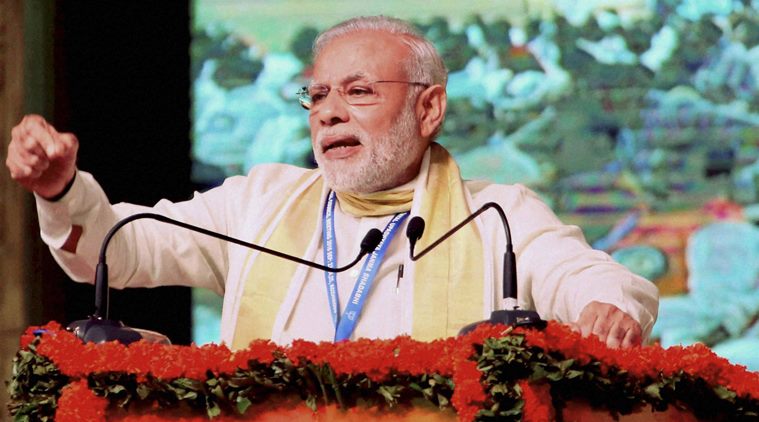Opinion Indus Waters Treaty: PM Modi may look at review and pressure tactics instead of military escalation against Pakistan
India-Pakistan relations have taken a bitter form after the terrorist attack on the Uri base that killed 19 Indian soldiers.
 paris agreement, paris agreement on climate change, climate change paris treaty, narendra modi government, modi at g20 meeting, climate change in india, ministry of external affairs, india news, indian express,
paris agreement, paris agreement on climate change, climate change paris treaty, narendra modi government, modi at g20 meeting, climate change in india, ministry of external affairs, india news, indian express,  Kozhikode: Prime Minister Narendra Modi addresses during BJP’s National Council Meeting at Kozhikode on Sunday. PTI Photo(PTI9_25_2016_000194A)
Kozhikode: Prime Minister Narendra Modi addresses during BJP’s National Council Meeting at Kozhikode on Sunday. PTI Photo(PTI9_25_2016_000194A)
Prime Minister Narendra Modi appears to be pressing ahead with unconventional pressure tactics on Pakistan to isolate it internationally in the aftermath of the Uri terror attack. As the PM looks for alternate options to military action, a review of the Indus Water Treaty looks a potent weapon in his armoury.
India-Pakistan relations have taken a bitter form after the terrorist attack on the Uri base that killed 19 Indian soldiers. Pakistan’s sponsorship of terrorism has forced India into taking pressure tactics as the government reiterates strategic restraint. Meanwhile, Pakistan has washed its hands off the issue and denied having any hand in the attack and termed the attack as an act of rebellion from Kashmiri militants despite compelling evidence that it was carried out by Pakistan-based terrorist groups.
WATCH VIDEO: Indus Waters Treaty: PM Modi Says Blood & Water Cannot Flow Together
India’s response to the Uri attack needs to be well thought out. After raising Pakistani atrocities in Balochistan on the UN stage, it is now the Indus river system – a major natural resource in the region – that is the centre of Modi’s ‘isolate Pakistan strategy’.
Extreme steps like abrogation of the treaty may not interest India at the moment. However, its review in times of sustained hostilities from Pakistan, could put pressure on Pakistan. It doesn’t seem that India’s decision to review will present the country as an aggressor that doesn’t follow international obligations. The concerns which arise are Pakistan’s ally China acting similarly on the rivers flowing to India. Though, at the moment, it appears that the government’s priority is sending a strong message across to Islamabad that India will not sit idle and take decisive steps against Pakistan.
WATCH VIDEO: Sushma Swaraj Hits Out At Pakistan In Her UNGA Address: Analysing Her Speech
The government has shown that it has a set of plans to act against Pakistan in such times without resorting to military action. Any attack risks drawing criticism from India’s allies and the US which is against any military escalation between the countries. However, sanctions, pressure tactics, diplomatic isolation are options that PM Modi seems open to considering.
The Indus water treaty was signed between India and Pakistan in 1960 that put an end to a 12-year tussle for water sharing from the Indus system of rivers. Pakistan gets 80 per cent of water from the Indus. The system has three eastern rivers—Ravi, Beas and Sutlej and their tributaries— and equal number of western rivers—Indus, Jhelum and Chenab along with their tributaries. Under the agreement, waters from the eastern rivers are allocated to India.
Also, India is “under obligation to let flow the waters of the Western Rivers”. The exceptions in this case are for—domestic use, non-consumptive use, agricultural use and generation of hydroelectric power. Several experts have contended that farming the waters flowing in the western tributaries through ‘run of the river’ will not put India into a legal trouble and it would not constitute violation of the treaty. These waters can be used for irrigating farmland and for production of hydroelectric power.
It is still too soon to say that a review will actually be setup. However, India will aim to gain leverage through the pressure and force Pakistan to act against the terrorists operating on its soil.






